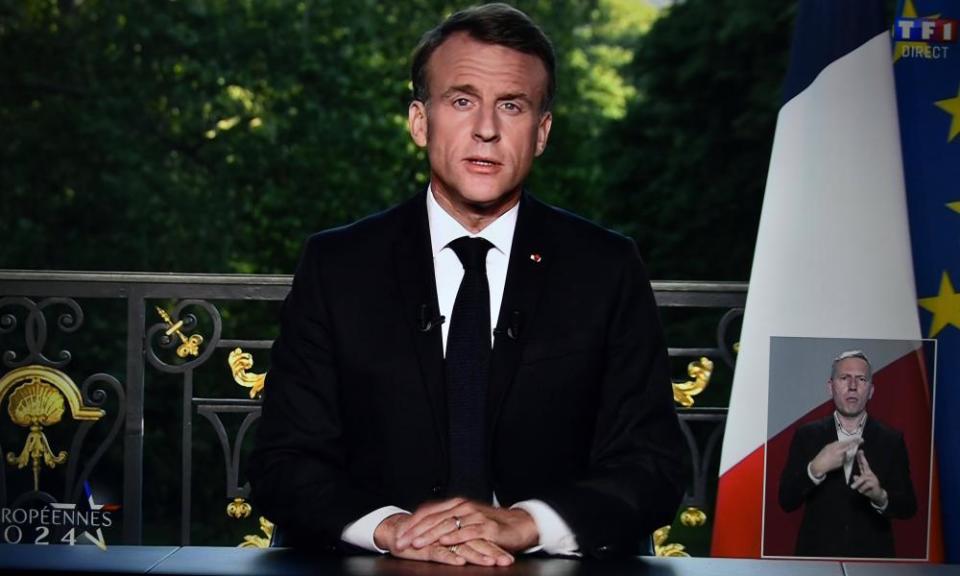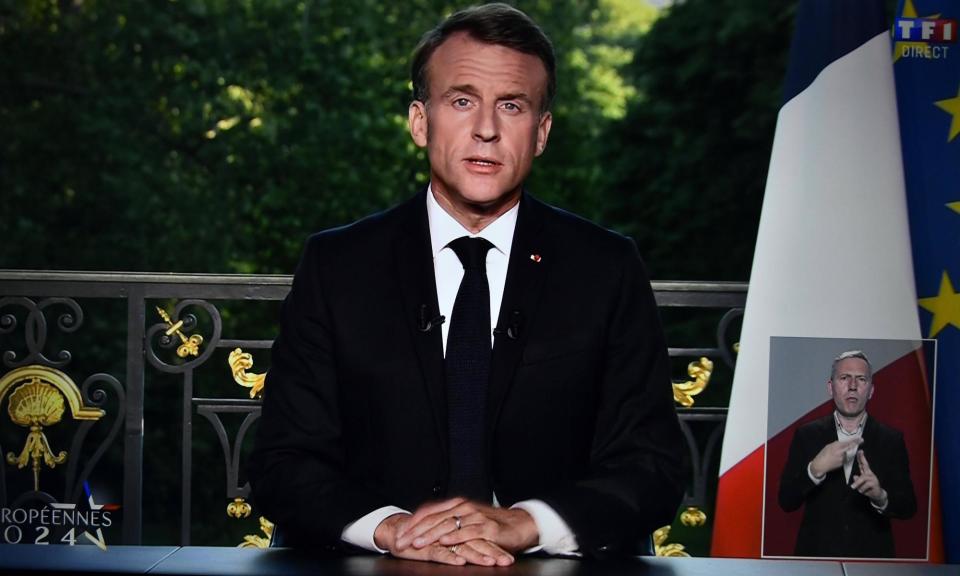EU elections: Macron to dissolve French parliament after crushing loss to far right
France’s president, Emmanuel Macron, has been accused of gambling with French democracy after announcing that he will dissolve parliament and call snap legislative elections in the wake of his allies’ crushing defeat to Marine Le Pen’s far-right National Rally (RN) in Sunday’s European parliament elections.
On a night that saw far-right parties make significant but far from conclusive gains in Europe, the RN won about 32% of French votes, more than double the 15% or so scored by Macron’s allies, according to projections, with the Socialists just behind on about 14%.
Related: EU elections: populist right makes gains but pro-European centre holds
The first round of elections for the national assembly will take place on 30 June and the second on 7 July, Macron announced in an address to the nation, in a huge gamble on his political future three years before the end of his second term as president.
The outcome of the European parliament elections was “not a good result for parties who defend Europe”, the French president said, noting that, led by RN, far-right parties in France had taken almost 40% of the national vote.
“I cannot act as if nothing had happened,” he said. “I have decided to give you the choice ... Therefore I will dissolve the National Assembly tonight.” He said the decision was “serious and heavy”, but called it “an act of confidence”.
Less than two months before the start of the 2024 Paris summer Olympic Games, Macron said he had confidence in “the capacity of the French people to make the best choice for themselves and for future generations”.
He added: “This is an essential time for clarification. I have heard your message, your concerns, and I will not leave them unanswered … France needs a clear majority to act in serenity and harmony.”
Others were less convinced. Raphaël Glucksmann, who headed the Socialist party’s list, said Macron had “given in” to Jordan Bardella, 28, the RN’s lead candidate for the European elections. “This is a very dangerous game to play with democracy and the institutions. I am flabbergasted.”
Another critic, Valérie Pécresse, a senior figure in the conservative Les Républicains party, said: “Dissolving without giving anyone time to organise and without any campaign is playing Russian roulette with the country’s destiny.”
The daily newspaper Liberation wrote in its front-page headline on Monday: “The extreme gamble”.
“Emmanuel Macron is a poker player, we’ve seen that tonight,” said a Green party MP, Sandrine Rousseau. But Marine Le Pen, the RN figurehead who is seen as the frontrunner in 2027 presidential elections in which Macron cannot stand, said she welcomed the decision.
“We are ready to put the country back on its feet. We are ready to defend the interests of the French people,” she said. Bardella said voters had delivered a “stinging rejection” of the president.
Macron’s Renaissance party currently has 169 deputies in the national assembly, and the RN 88. If the far-right party wins an outright majority in the upcoming election, the president would effectively lose control over most French domestic policy.
Analysts have said that is unlikely, however, partly because European elections are often seen by voters as a cost-free way of delivering a kick to the incumbent government and things may well turn out differently in a parliamentary election.
With turnout in the European elections projected in France at just over 52%, Macron will be hoping to attract the voters who stayed at home to block the far right and possibly recover the absolute majority his party lost in 2022 legislative elections.
An RN victory would probably see Bardella appointed prime minister. Perhaps the most likely scenario, analysts said, was an anti-extremism coalition between Macron’s centrists and the traditional rightwing Republicans or even leftwing Socialists.
Céline Bracq, director general of the Odoxa polling agency, described the president’s announcement as a “poker move” at a time when there was a “strong desire among the French to punish the president”.
Luc Rouban, a political scientist at Sciences Po in Paris, said Macron wanted to “trap” the RN with his sudden election announcement, arguing that the far-right party would have trouble mustering quality candidates to challenge for the assembly’s 577 seats.
But Mujtaba Rahman, managing director for Europe at Eurasia Group, told Agence-France Presse: “It’s obviously a major gamble. This is really Macron trying to seize the initiative. The most likely outcome is more fragmentation, more deadlock and chaos.”
While the far-right triggered a political earthquake in France and made major gains elsewhere, their progress was not universal, and mainstream parties looked set to keep a majority in the 27-member bloc’s parliament.
In Germany, the Alternative für Deutschland (AfD) jumped to 14.2% from 11% in 2019, despite a slew of scandals, while chancellor Olaf Scholz’s Social Democratic party slid to 14.6%, worse than its weakest ever result, in 2019. However, the The Christian Democratic Union/Christian Social Union, now in opposition, took a decisive lead, with 30.9% of the vote, according to provisional results.
The AfD’s success came despite a slew of scandals, including its lead candidate saying that the SS, the Nazi’s main paramilitary force, were “not all criminals”.
In Austria, meanwhile, the far-right Freedom party came top, with 25.7%, ahead of the conservative People’s party and the Social Democrats, on 24.7% and 23.2% respectively.
In the Netherlands, Geert Wilders’ far-right party was second behind a Left-Green alliance, but appeared to have fallen short of expectations. The Freedom party took 17% of the vote, while the Left-Green alliance, led by the former EU Commission vice-president Frans Timmermans, was on 21.1%.
But it was far from a clean sweep for the far right, which fell short of expectations in Belgium. And crucially, parties on the extreme right remain divided, making them less influential in Brussels.

 Yahoo News
Yahoo News 

